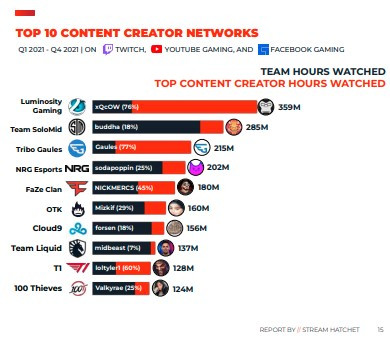
Stream Hatchet released its 2021 yearly report this week, revealing numerous insights and data analytics that the firm has gathered over the past year of streaming. Stream Hatchet is a data analytics company that creates reports about gaming brands and online streaming. Their 2021 report illuminates some of the biggest watch trends across Twitch, YouTube Gaming, and Facebook Gaming streaming platforms so that you can be informed about the overall state of the streaming industry.
Here are some of the top insights that Stream Hatchet revealed in its latest report!
The growth of live game streaming is healthy, but down compared to 2020
Livestreaming watch time overall grew by 21% year-over-year in 2021 across Facebook Gaming, YouTube Gaming, and Twitch. This is down from the unprecedented 81% growth witnessed in 2020 amid the pandemic lockdowns and pivot toward native online content. While the COVID-19 spike appears to be waning, a 21% growth across the industry is still remarkable.


Twitch hours watched grows by 31.6% in 2021
Twitch saw above-average growth, with Twitch averaging 6 billion hours watched across all four quarters, experiencing a 97% jump in Q1 of 2021, with 20%+ growth in Q2 and Q3, and dropping to only 5% growth in Q4. Year over year, in 2020 Twitch saw 18.5 billion hours watched annually, whereas 2021 saw 24.3 billion hours watched, a 31.6% increase overall.
Stream hatchet additionally reported that the Twitch platform is seeing growth outside the gaming space, with 12% of the total Twitch hours now dedicated to non-gaming streamed content.
YouTube hours watched shrinks by -19% in 2021
YouTube also had a strong Q1 of 2021, growing by 26% to 1.4 billion watch hours, but then saw losses in the final three quarters, ending Q4 with -37% watch hours down to 1.2B. Overall, YouTube actually lost 1.2 Billion views year-over-year, going down to 5 billion in 2021, despite signing massive creators like Ludwig to their platform.
Devin Nash argued the reason YouTube Gaming saw less growth last year is due to YouTube's algorithm focusing on Shorts instead of promoting live content. YouTube Gaming is also in a rough spot for future growth, after the departure of the Head of YouTube Gaming Fwizz this year for a Web 3.0 company.
Facebook Gaming grows by 52% in 2021
Facebook Gaming, while not on everyone's radar, is firmly competing with YouTube Gaming streams, averaging around 1.2 billion hours watched in each Quarter in their own right, and seeing strong growth of 87% in Q1, with its lowest growth rate being 35% in Q4. Overall Facebook Gaming is sitting at around the size of YouTube gaming at 4.8 Billion views in 2021.
The Facebook Gaming numbers demonstrate that it is a myth to claim that Facebook or Facebook Gaming is irrelevant in 2022. If their growth continues at its current trajectory, it will actually be a larger streaming platform than YouTube Gaming.
Most popular streamers in 2021 include xQc on top
Top 10 streamers by watch time in 2021

Luminosity streamer xQc blew everyone else out of the water last year in terms of raw hours watched. He clocked 272.9 million hours watched in total, a number assisted by the streamers insane 151 full days of streaming last year, or 3,629 hours.
Following xQc is Brazilian streamer Gaules at 165 million watch hours, Spanish speaking streamer auronplay at 118 million watch hours, and Spanish speaking streamer ibai at 103 million watch hours. This shows a significant growth in the market of non-English speaking streamers. IN total, 50% of the top ten streamers in watch time are not English-speaking channels.
Top games included Grand Theft Auto V with 2.7 billion watch hours, League of Legends with 2.01 Billion watch ours, and Mobile Game title Garena Free Fire at 1.23 billion Watch ours. other notable top titles included PUBG Mobile, VALORANT, Warzone, and Minecraft, all sitting at over 1 billion watch ours a piece.
Esports teams watch hours dominated by content creators
Top 10 content creator networks in streaming in 2021

Watch time for Content creator networks according to Stream Hatchet contained eight esports teams, with only OTK and Tribo Gaules being creator networks without esports competitors.
The leading content creator network was Luminosity Gaming, though their views were heavily propped up by xQc's aforementioned insane numbers, accounting for 76% of their total views. In a similar fashion, T1's views were propped up by Tyler1 who recently left the org, and made up 60% of their streaming views in 2021, while Nick Mercs made up 45% of FaZe Clan's total views and Valkyrae made up 25% of 100 Thieves total views.
Overall, the numbers show that success in streaming for esports teams Is at least partly reliant on signing and promoting dedicated streaming content creators, as opposed to competitive success or even esports professional players streaming for the team. The biggest exception to this principle is Team Liquid, whose views are the most spread out, with their top streamer Midbeast only accounting for 7% of their total stream views.
The income gap for mega streamers vs micro streamers continues to grow
While small streamers account for around 93% of the total streamers on Twitch, they only account for 56% of total subscription revenue. The top 1.2% of influencers generate a disproportionate amount of the total revenue, at over 15%, generating around $841k per year in subscription and bit revenue according to Stream Hatchet. They further clarified that only 50 influencers are in that 1.2% bracket, and it took them an average of five years to reach that level, playing against the myth that a broadcaster can start streaming on Twitch and become ultra-wealthy in a year or less.
The gender gap in streaming remains an issue
Another key insight from the Stream Hatchet report was that live streaming continues to be dominated by men. Of the top 200 creators in 2021, only 5% of them were women, which was up from only 3% being women in 2020. Of the total top 1000 channels by platform, 11.3% of Twitch are female streamers, 8.3% of YouTube, and 7.4 of Facebook Gaming.
"While each platform has made efforts to combat misogyny and hate speech with policy changes made throughout 2021, the distribution of female gaming creators across the top creators has only changed by 2 percentage points" the report stated.
The report highlighted Facebook Gaming's female creator spotlights and virtual meetups as an effort to combat misogyny in gaming, while Twitch updated its misconduct policy multiple times in 2021 to try to address instances like the infamous hate raids and YouTube has promoted Valkyrae as a role model for female creators. Despite these efforts, female creators like Pokimane, Valkyrae, and Amouranth have all experienced widespread abuse and harassment on their respective platforms.
Devin Nash argued that the reason for the ongoing underrepresentation of women in gaming is a cultural problem, where women have to work harder and experience more barriers and harassment than men in order to even be in the conversation.
He stated in a video on Wednesday: "Being a female influencer is a hellscape of constant objectifying comments and harassment. And the people who have succeeded have done so at great difficulty, and are pounding the pavement to get around that harassment and that difficulty to get to this level."
You can see the full 2021 Yearly report from Stream Hatchet here.
-

Aaron is an esports reporter with a background in media, technology, and communication education.
Sort by:
Comments :0





